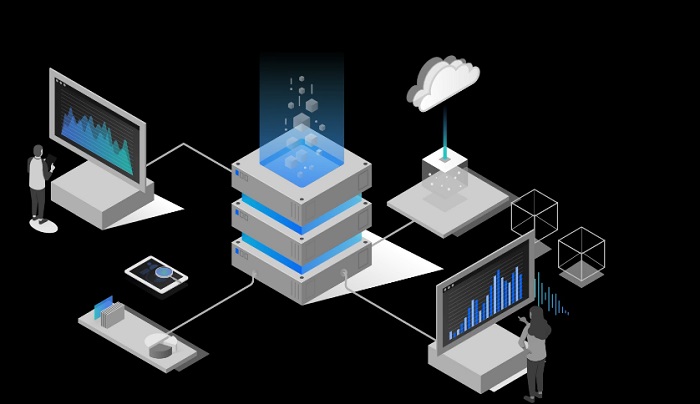American businessman and ‘Father of Trusts’ Charles Ranlett Flint merged four companies, Computing Scale, Dial Recorder, Electric Tabulating Machine, and Time Clock, to lay the foundation of Computing-Tabulating-Recording Company (CTR) in June 1911. However, the company changed to its present-day name International Business Machines Corporation (IBM), in 1924. Its Social Security system came in as a big break back in 1936. IBM’s DOS-based computer launched in 1981 created a buzz. The Multinational Technology Corporation established its base in Armonk, New York, and is currently operating from more than 171 countries. IBM - the name is no stranger to anyone today. It is one of the largest U.S Corporations sharing the space with younger companies like Microsoft, Google, Apple, etc.
IBM turned 100 in 2011….
There is no denying that IBM is one of the earliest and oldest IT organizations that build computer software, hardware, and middleware. Apart from these, it extensively offers a wide array of consulting services, including IBM consulting, business consulting, security, application, technology support, hybrid cloud services, and much more.

Source: IBM
“We discover, develop and design advanced information technology solutions, translating them into valuable products for our clients,” says the company.
The company is escalating to new heights under the supervision of its current Chairman and CEO, Arvind Krishna, with a few prominent acquisitions, such as Red Hat in July 2019, Turbonomic in June 2021, and Databand recently in July 2022.
IBM has a short, yet powerful tagline, “THINK.”
Goodfirms, the top-rated B2B review, and rating platform, conducted a comprehensive, transparent, and impartial review of the most valuable products and solutions of IBM, their latest explicit features, key advantages and disadvantages, and a detailed pricing model for each product. Also, this IBM review article discusses the top viable alternatives to its products and services, helping users make the best selection.
The core highlights of this review article include
- Popular flagship products of IBM cloud infrastructure
- Is IBM a top-rated cloud computing, quantum computing, and hybrid cloud solutions provider?
- How does IBM optimize various business operations and improve organizational efficiency with modern enterprise applications?
- Does it provide fortified and unparalleled security solutions to protect confidential data?
Goodfirms has put an honest effort into answering all the above questions through thorough research on the topic.
A Complete Review of IBM Products
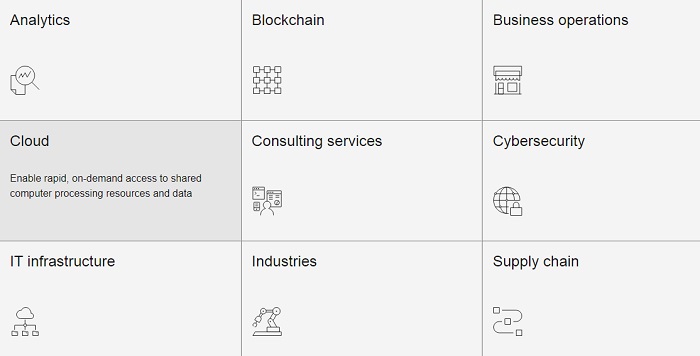
Source: IBM
International Business Machine (IBM) has a rich history of more than 110 years of becoming the pioneer of cloud computing, quantum computing, data analytics, and many more advanced technological solutions. It has become the dominant consulting services company that introduced innovative technologies, like relational databases, dynamic random access memory (DRAM), nanotechnology, and mainframe computers.
“Technology is transforming enterprises' business models across the globe, creating new opportunities for growth and fresh benchmarks of cost and efficiency.” - Mark Foster, Chairman, IBM Consulting.
IBM has made a significant contribution to strengthening and expanding the Infrastructure-as-a-Service (IaaS), Software-as-a-Service (SaaS), and Platform-as-a-Service (PaaS) cloud services provided by private, public, and hybrid cloud models and Function-as-a-Service (FaaS). IBM designs next-generation hardware services, such as Power Microprocessors and Secure Blue, which is encryption hardware. It has streamlined IT sourcing services with multiple and powerful data centers worldwide.
Goodfirms has meticulously reviewed all the major and popular IBM software products and services, starting with Cloud Computing, Analytics, Blockchain, Supply Chain, Business Operations, and many others. You can view them below.
Goodfirms Review of IBM Data & Analytics Solutions
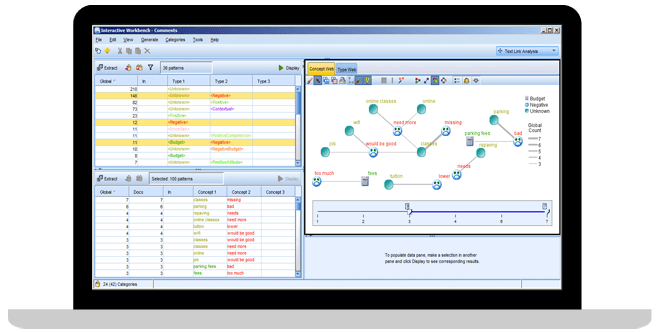
Source: IBM Analytics Tools
IBM Analytics is a leading frontline data analysis software that helps businesses to optimize their data strategy and drive improved data-enabled decision-making. The software uses artificial intelligence and machine learning to leverage real-time customer data and automate business operations. IBM Analytics utilizes an architectural and data fabric approach to connect with the right people at the right time, increase agility, and predict accurate results.
Better predictions and analytics
Organizations can simplify data access and unleash self-service data consumption using Data Fabrics. The key features of data fabrics include an augmented knowledge graph, unified data lifestyle, multimodal governance, AI-powered, hybrid-ready clouds, etc.
IBM Analytics also enhances agility and efficiency as a data management platform. The tool improves data resiliency and scalability and complies with governance and risk compliance.
IBM offers Business Analytics solutions that help organizations to create dynamic plans and budget estimates to predict accurate outcomes. It allows them to uncover the latest trends by accessing real-time data insights. It is backed by AI solutions to analyze business performance comprehensively. Businesses can look to strengthen their customer relationships with AI-enabled customer service solutions that allow them to personalize experiences.
The Popular Products of IBM Analytics
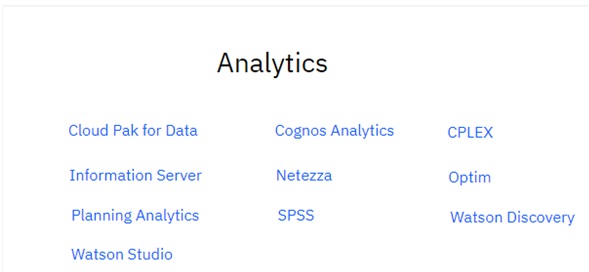
Source: IBM Analytics Tools
When you browse through popular IBM Analytics products, you will come across several options, such as Cognos Analytics, Cloud Pak for Data, Information Server, Optim, SPSS, Watson Studio, and many more. However, Goodfirms has chosen to review only a few selected ones, which are as follows-
IBM Cognos Analytics
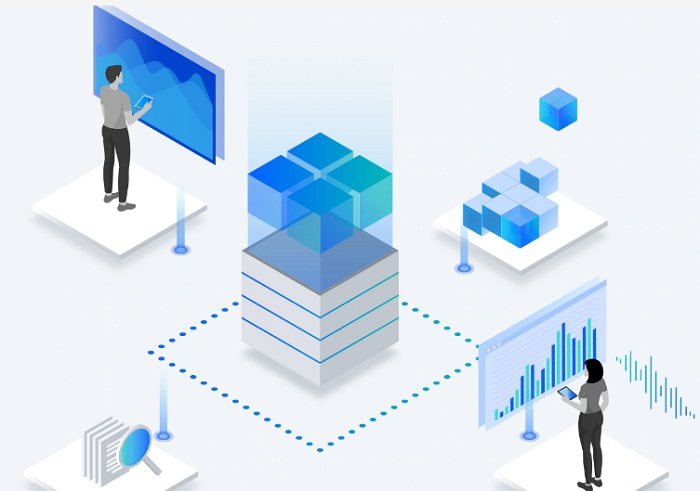
Source: IBM Cognos Analytics
Cognos Analytics is a powerful business intelligence software and performance analysis solution from IBM, supported by IBM Watson. The platform also acts as an intelligent data visualization tool that indicates the current position of a business in the landscape and helps entrepreneurs predict the next market move. IBM Cognos Analytics is empowered by AI solutions bringing an accurate picture of the business with precise reporting and monitoring of events and metrics. Cognos is also available as a mobile application.
Forrester reported in 2022 that Cognos Analytics has the capacity to help users with:
- Increased operational efficiency
- Cost savings from retiring legacy applications
- Time-saving
IBM Cognos Analytics comprises some basic critical features, such as Cognos Connection, Query Studio, Analysis Studio, Report Studio, Event Studio, Workspace, etc. Each component performs vital functions that streamline and simplify the workflow process. Also, these elements play a pivotal role in automating data extraction, visualizing data and reporting it, securing confidential data, and much more.
With enhancements in AI capabilities, reporting, usability, and data modeling, IBM released Cognos Analytics with Watson version 11.2.2 in March 2022.
- IBM also unveiled Cloud Pak for Cognos Analytics 4.5 in August 2022.
- SOC 1 Type 2 and SOC 2 Type 2 reports are now available with the expansion of IBM Cognos Analytics Cloud Compliance posture.
What’s the latest?
IBM ended its support for Cognos Controller version 10.3 X back in 2021, 10.2 X in 2023, and 11.0.X in September 2021.
Benefits:
- It has a more intuitive and seamless interface
- Lower costs of maintenance
- Faster results and improved decision-making
- Can use different varieties of charts
- Flexible deployment and secure environment
Drawbacks:
- IBM has already ended the support for IBM Cognos Analytics version 11.0 and IBM Cognos Controller version 10.3X on September 30, 2021. Also, it will end the support for Cognos Metrics version 10.2X recently on April 28, 2023.
- Reporting features must be simplified
- Requires full training for new users
- IBM Cognos Analytics does not support various features, such as grouping data, customized visualizations, custom color pallets, insights in visualizations, etc.
IBM Cognos Analytics: Pricing Plans
There are three types of Pricing Models under IBM Cognos Analytics. These include
- On-Demand
- On Cloud Hosted
- Client Hosted
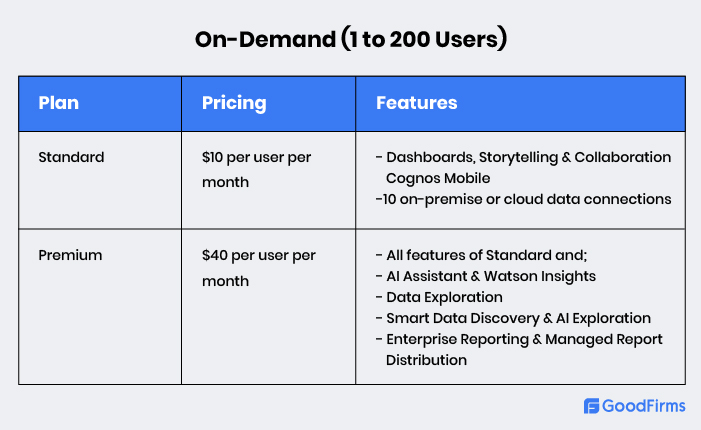
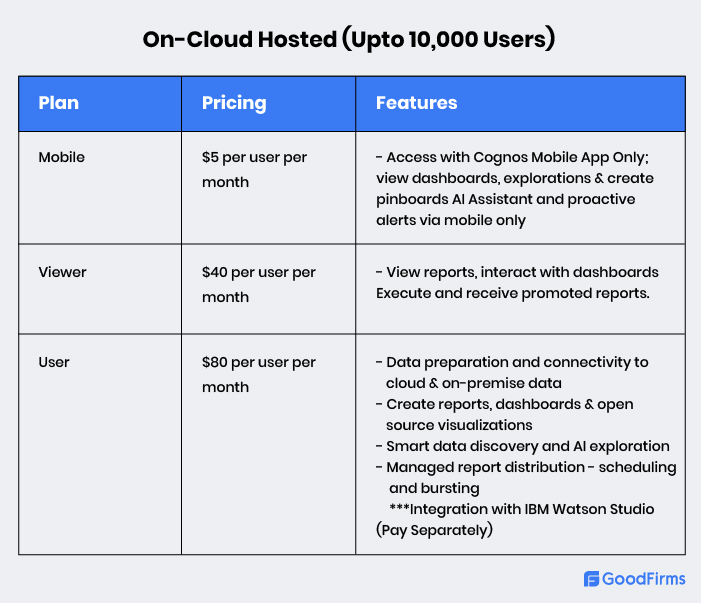
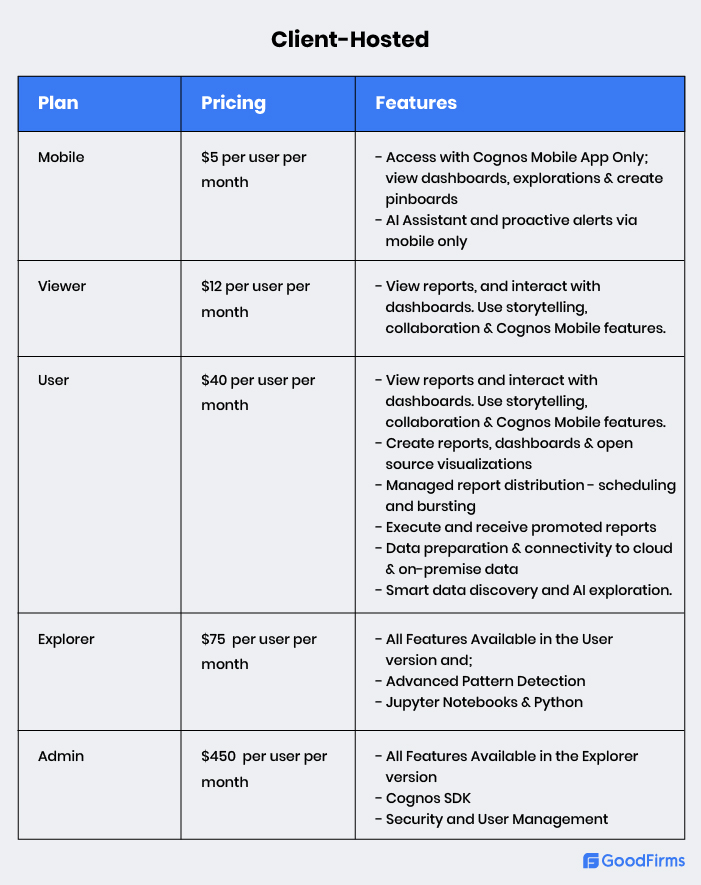
**** Each of the plans comes with a 30-day free trial period.
IBM Cognos vs. Tableau - The Key Difference - 2023
If you are searching for top alternatives to IBM Analytics, you can consider buying other software tools, such as Tableau, Power BI, Oracle Analytics, QlikView, etc. We have compared here IBM Cognos with Tableau.
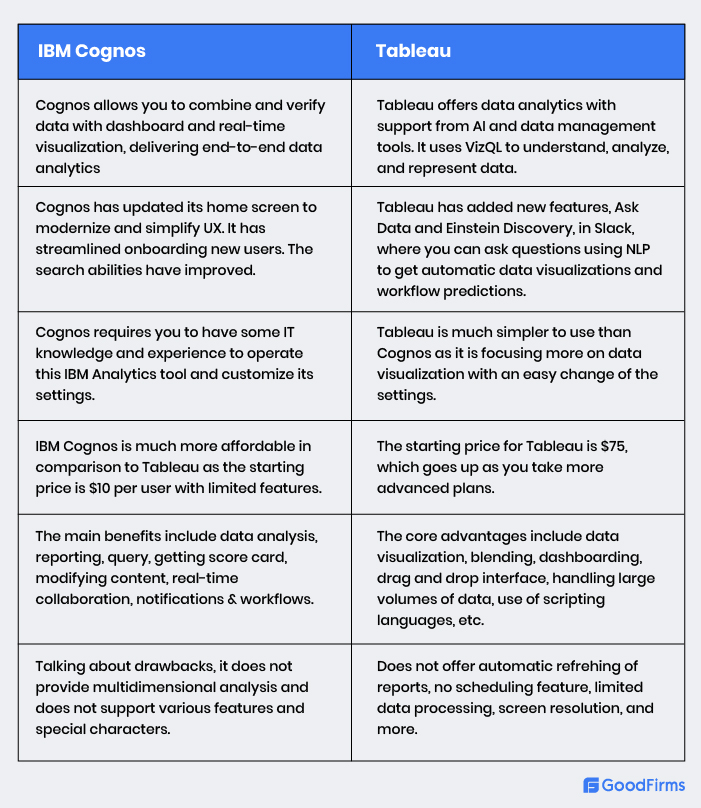
IBM Planning Analytics with Watson
Source: IBM Planning Analytics
For large corporates and organizations involved in constant planning, creating business strategies, and decision-making processes, IBM Planning Analytics with Watson can become a viable solution. The tool simplifies complex financial and operational planning across the enterprise covering sales, supply chain, HR, IT, and marketing.
IBM Planning Analytics with Watson is a sales forecasting software empowered by artificial intelligence that breaks the silos of manual planning with complete automation and accurate forecasting of different business processes, such as supply chain, sales, and financial planning. This advanced solution from IBM aims to enhance higher performance and speed up various tasks. You can quickly deploy this software on the cloud, on-premise, or IBM Cloud Pak for data and analyze it from anywhere, anytime.
Benefits:
- Predictive forecasting
- Operational efficiency
- Increased agility
- Lowered Cost
- Accelerated Innovation
Drawbacks
- Addition of more AI features
- In-depth documentation for budgeting and forecasting
- Can be a bit expensive
- Can improve automation features
New Features in November and October 2022
- IBM released the updated Planning Analytics with Cloud Pak for Data 4.5.3 in October 2022.
- Also, IBM has introduced new features in the latest version of Planning Analytics Workspace, such as automated removal of duplicate members from the current set, improved error handling during the missing of a mapped member, and the option to change the fill color of single-cell widgets.
- Besides that, IBM has also updated plans and applications, allowing you to add attachments.
- Planning Analytics Workspace will now have a new dimension editor with various performance enhancements and usability functions.
- IBM has removed the classic dimension editor from the latest version of Planning Analytics Workspace.
IBM Planning Analytics Pricing
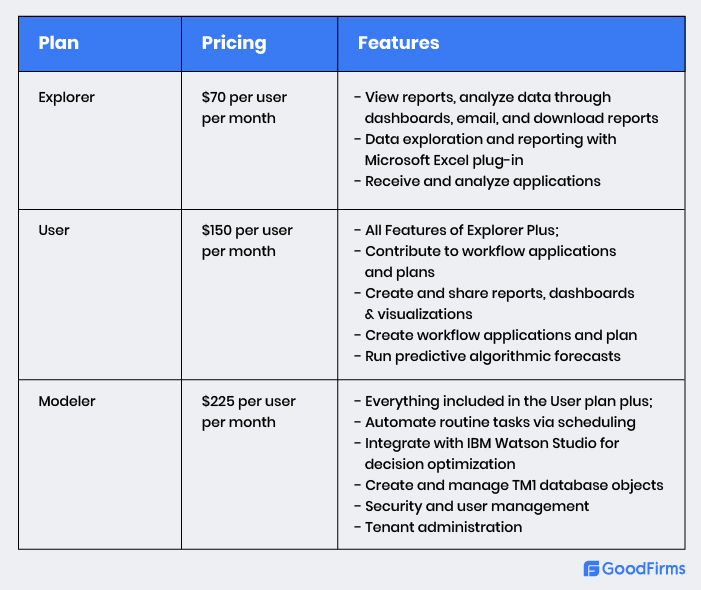
IBM Planning Analytics vs. SAP Analytics
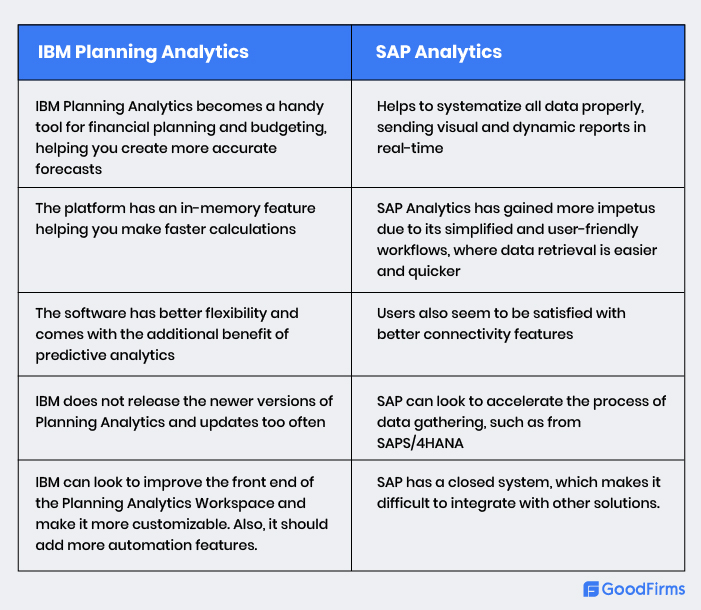
IBM Business Analytics Solutions
IBM has developed smart business analytics solutions fueled by artificial intelligence and integrated workflow system, helping organizations make more accurate data-driven decisions. Business analytics from IBM efficiently caters to the requirements of diverse industries, such as sales, marketing, supply chain, finance, HR, and IT companies. The presence of business intelligence tools accelerates planning, budgeting, and forecasting.
IBM Business Analytics is an enterprise-grade and advanced reporting tool with self-service analysis and strategic planning capabilities. When aligned with IBM Planning Analytics, Cognos Analytics, or Watson, the platform becomes a single point of contact for data extraction and future business planning.
Introducing IBM Business Analytics Enterprise
Recently, in November 2022, the company released IBM Business Analytics Enterprise, a new software to mitigate all data silos and optimize analytics and planning. The new software tool is a suite of business intelligence, reporting, planning, and dashboard solutions, providing comprehensive data sources in combination with Watson and IBM Cognos Analytics. The platform also includes IBM Analytics Content Hub allowing users to use analytics and planning tools in a single dashboard.
IBM Analytics: Pros & Cons

Goodfirms Review of IBM Cloud Computing Solutions
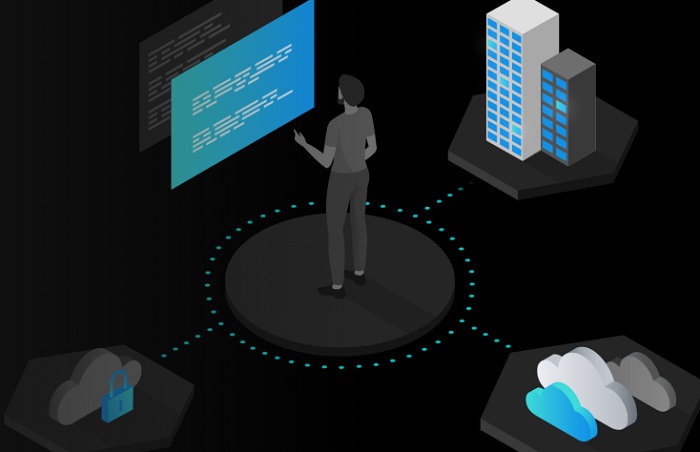
Source: IBM Cloud Computing
IBM Cloud Computing is a comprehensive set of a wide assortment of products and services, which have evolved from an amalgamation of Software-as-a-Service, Infrastructure-as-a-Service, Platform-as-a-Service solutions, mainframe computing, and virtualization technologies.
IBM Cloud was released in April 2011, and today it stands tall as one of the pioneers of cloud computing and the first implementers of automation and standardization in the technology. The company has played a considerable role in upscaling the SaaS, IaaS, and PaaS technologies.
IBM offers four types of cloud solutions; Public, Hybrid, Multi-Cloud, and Virtual Private Cloud.
- IBM public cloud provides a multi-tenant platform, and the company manages all the vital resources like infrastructure and hardware. The public cloud is open and secure, offering access to users over the internet.
- For the hybrid cloud environment, IBM uses IBM Cloud Satellite to ensure flexibility and scalability of the public cloud and seamless running of data on private clouds.
- Multi-cloud is a cloud computing solution that allows users to use multiple clouds from different vendors. It is built on open source cloud-native technologies, helping to manage workloads across multiple clouds.
- Users willing to create their own private cloud environment can use Virtual Private Cloud or VPC on a shared public cloud infrastructure. Users gain more control over virtual networks, isolated from the public cloud tenants.
IBM Cloud Products
IBM offers more than 170 cloud-based solutions, such as Analytics, Blockchain, the Internet of Things, Artificial Intelligence, Automation, Databases, and much more. Below are the core IBM Cloud products.
#1. Artificial Intelligence / Machine Learning
IBM’s artificial intelligence solution is known as Watson, which helps businesses to make accurate predictions, automate processes, and optimize team performance. Businesses can leverage real-time data from diverse sources to make data-driven decisions and streamline their interactions with customers and build their own data models.
The key products of IBM Watson AI are Assistant, Discovery, Natural Language Understanding, Speech to Text, Text to Speech, Knowledge Studio, Language Translator, Natural Language Classifier, and many more.
#2. Analytics
If you want to discover new insights and delve deeper into data, you can rely on cloud analytics. You can deploy this IBM solution anywhere, and it is embedded with intelligent tools that help you to analyze data and create machine learning models with ease. You can connect with teams seamlessly and speed up the delivery of insights. IBM Cloud Analytics offers a wide range of solutions, such as IBM Analytics Engine, Apache Spark, IBM Information Server on Cloud, IBM Master Data Management on Cloud, and IBM Streams.
#3. Automation
IBM Automation is a next-generation innovative solution that focuses on optimizing business processes, improving employee efficiency, and streamlining IT systems. All these factors upsurge enterprise performance, enabling project managers to make smarter decisions and minimize costs. IBM offers three types of automation; IT, Business, and Integration solutions, each having distinctive features and benefits.
#4. Blockchain
IBM offers blockchain solutions that offer new monetization opportunities, automate reconciliation tasks, enhance accountability, and optimize operational agility with best-in-class tools to accelerate performance. The different solutions include Blockchain Transparent Supply, IBM Food Trust, and Hyperledger Fabric Support Edition.
#5. Compute
By availing IBM Cloud Compute services, you allow IBM to manage the infrastructure, and you manage the environment. The solution comes with high-end servers, modern global data centers, a serverless coding facility, and Kubernetes management. IBM offers the best infrastructure to handle any workload. These include Bare Metal Servers, Virtual Private Cloud, Virtual Servers for Classic Infrastructure, Containers, Platform-as-a-Service., etc.
#6. Containers
This cloud product from IBM helps to create and deploy containerized applications seamlessly in the cloud with additional support from open source technologies and continuous integration and continuous delivery tools. Containers help to improve application quality and respond quickly to market changes, which gives organizations a faster time to market.
#7. Databases
IBM Databases are powerful and highly secured managed services for analytics and data. The robust and innovative database solution protects in-flight and at-rest data by implementing an open source hybrid approach. IBM databases address the data-intensive requirements of data scientists, developers, and IT architects. Hybrid databases enable cost-efficiency, enhanced performance, improved mobility, etc.
#8. Developer Tools
IBM has further improved DevOps capabilities to introduce DevSecOps, which is a short form of development, security, and operations. The DevSecOps culture implements innovative practices, and cloud-native architectures, and uses the best toolchains to boost productivity. IBM DevOps encourages continuous deployment and software testing with a focus on collaborating culture and increasing cost-effectiveness. The different solutions include planning, building, verifying, releasing, deploying, and monitoring.
#9. Integration
IBM Integration allows you to connect your tools and applications seamlessly to uncover real-time data insights and extract the information needed for making critical business decisions. It includes capabilities, such as iPaaS application integration, event integration, API management, and enterprise messaging. The IBM Integration tools include App Connect, IBM MQ, Cloud Pak for Integration, DataPower Gateway, Aspera, and Event Streams.
#10. Internet of Things
When IOT-powered devices and large volumes of data align with IBM cloud solutions, businesses can extract insights from multiple sources in real-time to visually access data from anywhere and improve operational efficiency. IBM IoT solutions provide enterprise asset management software tools, facilities management software tools, and systems engineering, all enabled by artificial intelligence and machine learning capabilities.
#11. Logging and Monitoring
Logging and monitoring capabilities from IBM enable businesses to meet their specific goals. Logging helps to identify any suspicious activity in the secure zone, providing messaging interface audit logs, firewall, database, and operator workstation, in addition to recording minimum logs, etc. Monitoring, on the other hand, detects abnormal activities related to logging capabilities and all processes are in place. It also monitors servers, applications, and operating system logs, along with network and security monitoring.
#12. Networking
If you want to integrate a highly secured and globally accessible network for your business, you can bank upon IBM Cloud Networking solutions. IBM Networking allows you to create a unique configuration to optimize network traffic flow and secure and support applications based on business requirements. The Networking solutions include IBM Cloud Direct Link, Gateway appliances, and IBM Cloud DNS services.
#13. Quantum
IBM Cloud solutions provide users with an advanced Qiskit Runtime programming model and native service to create, deploy, optimize, and successfully execute quantum programs and workloads. IBM also comes with Quantum primitives that simplify and accelerates programming execution. This solution is based on the pay-as-you-go model, which means that you only pay for what you use.
#14. Security
IBM provides a robust and end-to-end security solution with advanced capabilities and high reliability to protect all your confidential data and backend information. IBM’s fortified security practices include complete embedded security, best compliance management tools, and technical support at every step. IBM also offers a wide range of security-based products with advanced confidential computing, compliance, and data centers.
IBM has introduced a new innovative technology known as confidential computing that protects and separates sensitive data in a secured CPU while processing. You can access it only through an authorized programming code. Confidential computing helps to safeguard data even during its usage and protects intellectual property. It nullifies all concerns of users while selecting the cloud providers and protects data processed at the edge.
#15. Storage
IBM Storage solutions enable users to store and protect data, insights, and other critical information in a highly scalable and affordable way with comprehensive support from cloud-native and conventional workloads. You can deploy different services like file storage, access object, and block. Also, optimize performance and manage storage capacity with ease.
IBM offers a robust open cloud data lake that helps to power applications, analytics, and artificial intelligence. It is a central repository that efficiently manages large data volumes and analyzes structured, semi-structured, and unstructured data. IBM Data Lake approach includes automated integration, embedded governance, and virtualization. Also, the Data Lake solutions involve IBM Db2 BigSQL, IBM Db2, and IBM Netezza.
What’s New in IBM Cloud Platform as of 2023 and 2022
- In December 2022, IBM added a new checklist in the Cloud docs to get started with the software allowing users to complete all tasks before using the tool.
- In January 2023, IBM enhanced the IBM Cloud Cost Estimator enabling users to save and share multiple estimates to their accounts.
IBM Cloud Pricing
IBM uses two pricing systems for all its cloud-based products and solutions. The first is the free tier, and the second is IBM Cloud Cost Estimator.
Also, IBM provides three types of flexible purchase models. These include
- PayGo with Committed Use - This is a pay-as-you-go model where IBM offers a good discount on usage, and you get billed every month for what you consume.
- Reserved Instances - This purchase model can also become a profitable deal where IBM offers guaranteed resources for deployments. You must select between one or three-year contract terms to get the reserve capacity.
- Subscription and Commitments - Here, you get a subscription account with several features available in the pay-as-you-go model. And discounts for the platform.
Free-Tier Model
It is worth noting that IBM offers more than 40+ products as always free with its Lite plan. A few IBM Watson and APIs are also included in this free-tier model. These software products do not have an expiration date, and you can use them without paying a single penny.
Also, this pricing model includes access to 50+ products with a pay-as-you-go account and a limited free edition. It means that you only have to pay for a service or solution that exceeds the free tier limit. You can cancel the subscription anytime.
Besides these, there are various other always free products that you can use for a lifetime. Also, there are a few selected products with free credits, available for a limited time. IBM also offers a few of its products on a 30-day free trial period.
IBM Cloud Cost Estimator
This is an IBM pricing model where users can calculate and make an estimate of the product or service. The cloud price calculator helps to configure the products, allowing users to view how IBM determines the price. They can download the price quotations to decide whether or not to invest in the product.
IBM Cloud: Pros and Cons
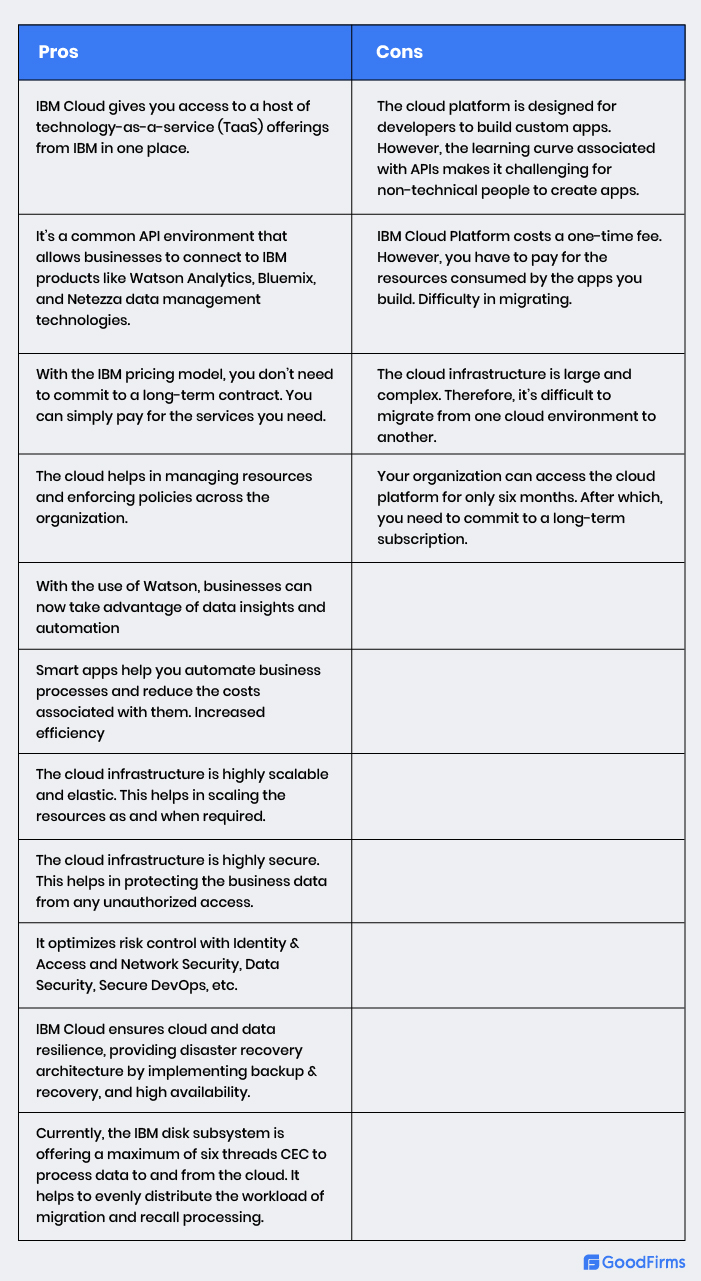
Top Alternatives for IBM Cloud Solutions
If we talk about the top alternatives for IBM Cloud solutions, you will come across some of the top-notch giants like Oracle Cloud Infrastructure, Amazon Web Services, Microsoft Azure, and Google Cloud Platform. Here, we will see how IBM Cloud flares against OCI.
IBM Cloud vs. Oracle Cloud Infrastructure (OCI) 2023

Goodfirms Review of IBM Blockchain Solutions
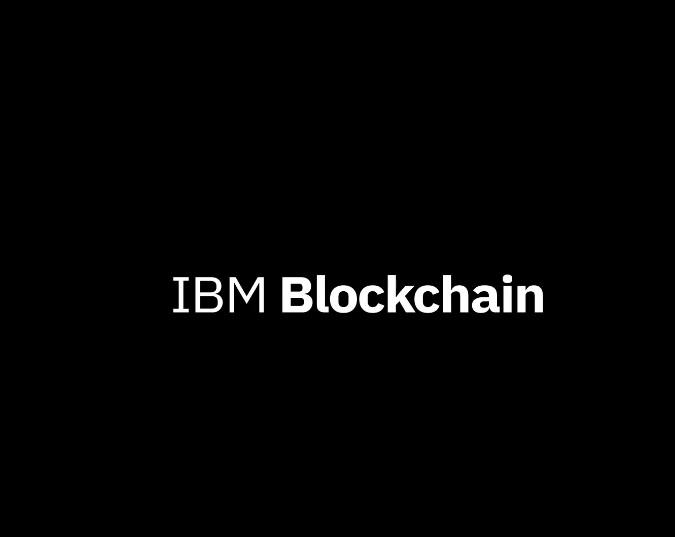
Source IBM Blockchain
IBM Blockchain Solutions is a shared, non-tempered, and distributed ledger system that records all immutable transactions and tracks all tangible and intangible assets in real time. Using IBM Blockchain, you can share real-time and transparent information accessed by specific members who have permission to view the different blockchain networks. IBM records the transactions as blocks of data connected to a chain of blocks where each block fortifies strength, thus forming a tamper-proof and irreversible blockchain.
IBM Blockchain Platform: Hyperledger Fabric Support Edition

Source IBM Hyperledger
One of the frontline and specialized enterprise IBM Blockchain solutions is Hyperledger Fabric open source code tool, offering 24x7 support with SLA certification. It is essential to note that IBM is the founder and premier member of the Hyperledger open-source community, extensively using this solution to create its products and working collaboratively with the community to bring new changes, updates, or fixes.
IBM Hyperledger Fabric ensures production continuity and mitigates all threats related to cybersecurity and ransomware attacks. It updates the Hyperledger community regularly to fix bug issues and automate regression testing. This IBM Blockchain Platform meets the specific business requirements, enabling them to carry out confidential transactions easily and providing a pluggable architecture that helps them customize their needs.
IBM’s new Hyperledger Fabric support has been equipped with additional features, such as IBM-certified images, code security scans, break/fix level 3, and more.
In IBM Blockchain, the shared ledger gets updated once the transaction becomes valid through all participants' involvement. Also, once the transaction record gets approved, it automatically gets created across the ledgers. Participants can only add the block and not remove it. Hence, all transaction records become permanent, helping to boost the trust factor.
IBM has optimized Blockchain Platform Software to deploy the Kubernetes platform on Red Hat OpenShift. This ensures better flexibility while selecting the location of blockchain network components deployment. The available options are public cloud, on-premise, or hybrid cloud.
Benefits:
- Enhanced security
- Transparent
- Traceable
- Increased Efficiency
- Automated
Drawbacks:
- Difficult learning curve
- Can be expensive for small and medium businesses
- Needs a better documentation
Pricing for the IBM Blockchain Platform
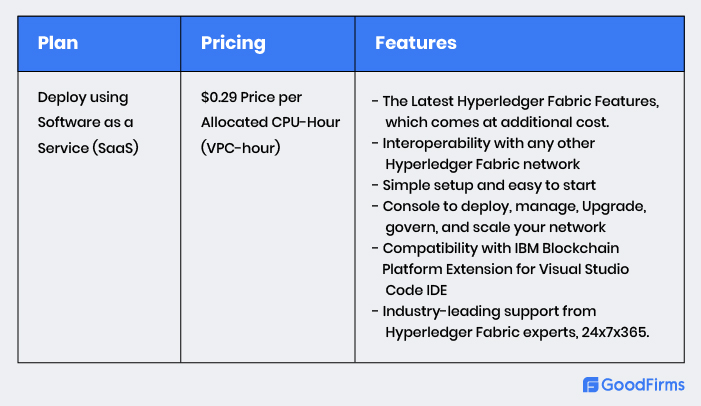
Pricing for IBM Hyperledger Fabric Support Edition
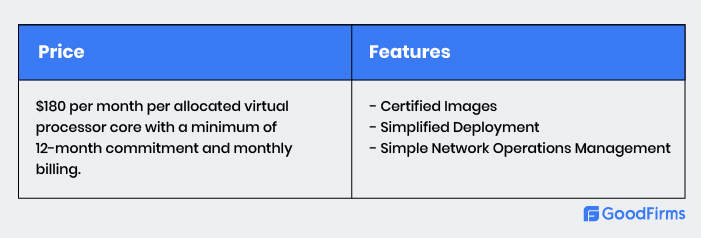
Blockchain Transparent Supply
IBM Blockchain optimizes supply chain management with a robust ecosystem where businesses can easily share data securely with an access control facility. They can also build distributed or shared ledgers to carry out transactions with supply chain partners in a reliable way, which helps to improve accuracy and establish better connectivity with them. Businesses can look to validate and authenticate their product quality and enhance traceability with real-time forecasting.
IBM Food Trust
IBM has created a robust collaboration among all professionals belonging to the food industry. It includes the farmers, processors, wholesalers, distributors, retailers, manufacturers, etc., that improve visibility and transparency across the food supply chain network. IBM Food Trust is built on blockchain technology, adhering to the US Food and Drug Administration (FDA) compliance. The solution comes with a few add-on services, such as virtually guided onboarding, assisted onboarding, and architect support. It allows businesses to build stronger brands, enhanced safety, and fraud protection, and minimize waste.
IBM Supply Chain Control Tower
This IBM solution offers real-time actionable insights and visibility to optimize the entire supply chain network powered by artificial intelligence. It helps businesses to understand, analyze, and predict the implications of certain events, and future occurring disruptions, and mitigate downtimes. Businesses can improve agility, respond to changes quickly, and make collaborative data-driven decisions. IBM Supply Chain Control Tower provides intelligent workflows and smart integrations.
What’s New in the IBM Blockchain Platform
- IBM introduced Blockchain Platform version 2.5.1 with support for Fabric v2.x smart contract lifecycle allowing its decentralized governance in October 2020.
- IBM has upgraded the platform to support OpenShift container Platform 4.5 and Kubernetes v1.16-v1.18.
- IBM has also introduced a new process to configure Hardware Security Mode (HSM) support.
- Users get the option to update the existing channel application and nodes to Fabric v2.x.
- IBM has improved the certificate renewal process with different enhancements.
IBM Blockchain Platform: Pros and Cons
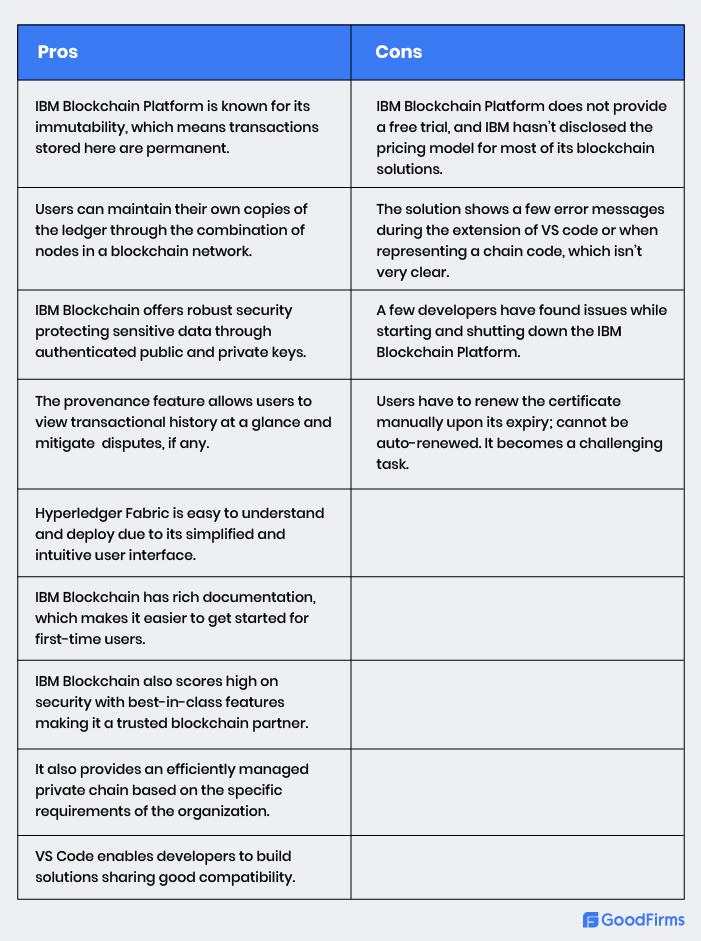
The Best Alternatives to the IBM Blockchain Platform
The top alternatives for the IBM Blockchain Platform include Oracle Blockchain Cloud Service, Microsoft Azure Blockchain, and Kaleido.
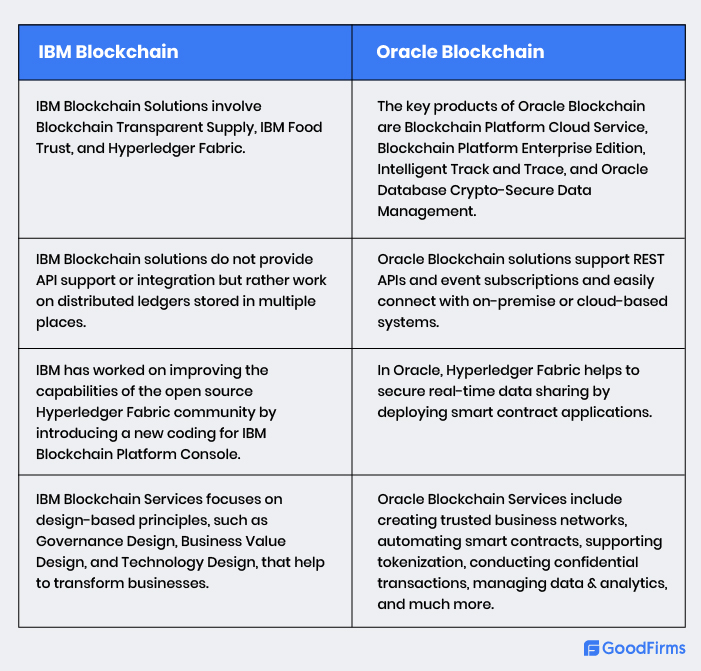
Goodfirms Review of IBM Business Operations Solutions

Source: IBM Business Operations
Businesses looking to optimize their day-to-day tasks by focusing more on high-priority initiatives, aiming to bring operational efficiencies and generate more revenue. Using IBM Business Operations Solutions, you can streamline and simplify your core activities, such as manufacturing, accounting and finance, marketing and sales, human resources, customer services, supply chain, information technology, and regulatory compliance.
IBM Business Operations is a business process management software that uses innovative methodologies to constantly delve into new data insights and accomplish operational goals. This futuristic solution is supported by an intelligent asset management system, business automation, and supply chain optimization with additional assistance from AI-powered tools.
Core Solutions That Come Under IBM Business Operations
IBM Intelligent Asset Management

Source: IBM IAM
IBM has built Intelligent Asset Management (IAM) solutions combining artificial intelligence and data to optimize asset performance and automate business processes. The solution offers a real-time prediction of all organizational assets, monitors their maintenance, and improves asset reliability. Also, IBM claims that its asset management system complies with environmental, social, and governance (ESG) goals with a focus on data management.
IBM Asset Management solution is known as Maximo Application Suite comprising advanced analytics tools with IoT and AI capabilities. Apart from managing assets efficiently, it provides various other features, such as remote monitoring, visual inspection, predictive maintenance, etc.
There are three pricing models under this IBM Asset Management Software; Maximo Application Suite, Maximo Application Suite-as-a-Service, and Maximo Application Suite Dedicated.
Supply Chain Optimization
If you are searching for smarter, next-generation, resilient, and sustainable supply chain management software that offers complete supply chain visibility, end-to-end inventory planning and management, transparency in managing and fulfilling orders, and orchestration, then you can rely on IBM’s most-adaptable supply chain management solutions.
IBM Business Automation Software
Managing an end-to-end business is a daunting task for most organizations as it involves several complex processes with quickly changing market landscapes. However, with IBM’s AI-powered Business Automation Software, you can cater to all these tasks with ease and understand the critical resources, such as tools, applications, and people. The idea is to infuse business intelligence in every business decision, says IBM. The key purpose of business automation software is to create a seamless experience, improve collaboration, and integrate intelligence. Moreover, with this low-code and no-code tool, business process experts can easily build automation quickly by themselves.
IBM Business Automation Software: Pricing Model
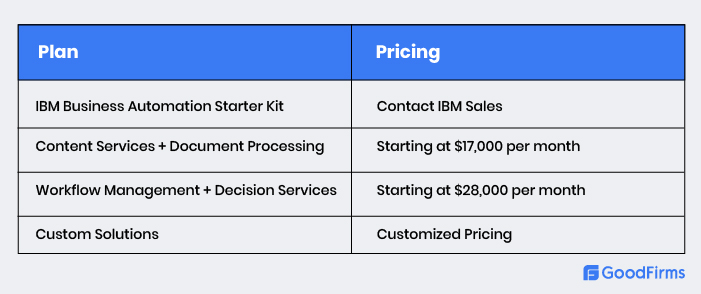
IBM Business Operations: Pros and Cons
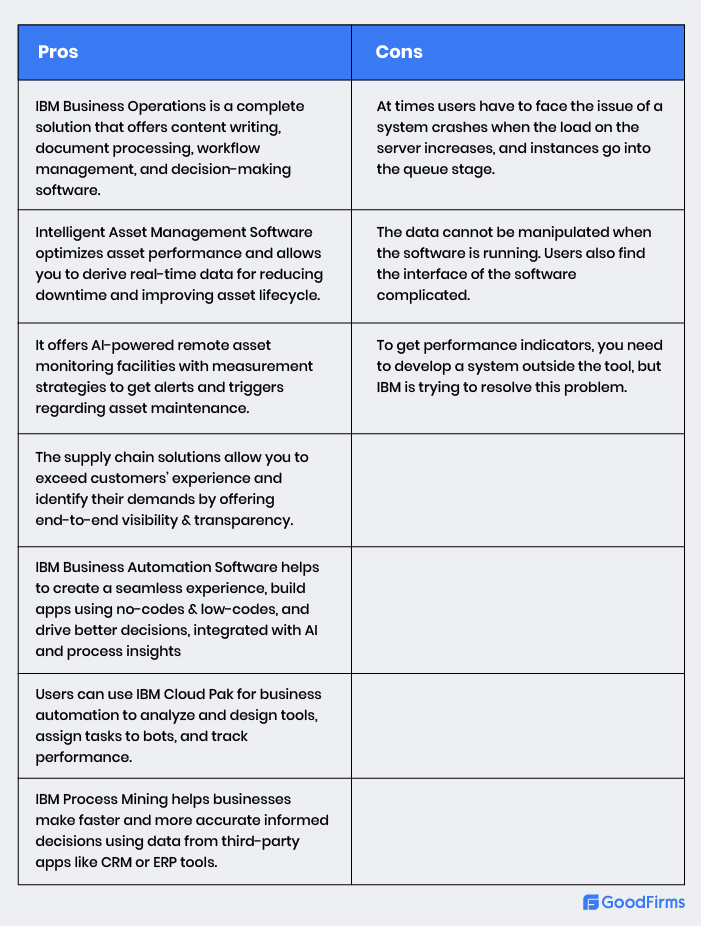
Top Alternatives for IBM Business Operations
If we talk about the top alternatives to IBM Business Operations, the viable options are TCS Business Operations, Conduent, Appian, and Bizagi Automation. Goodfirms has compared IBM Business Operations with TCS Business Operations.
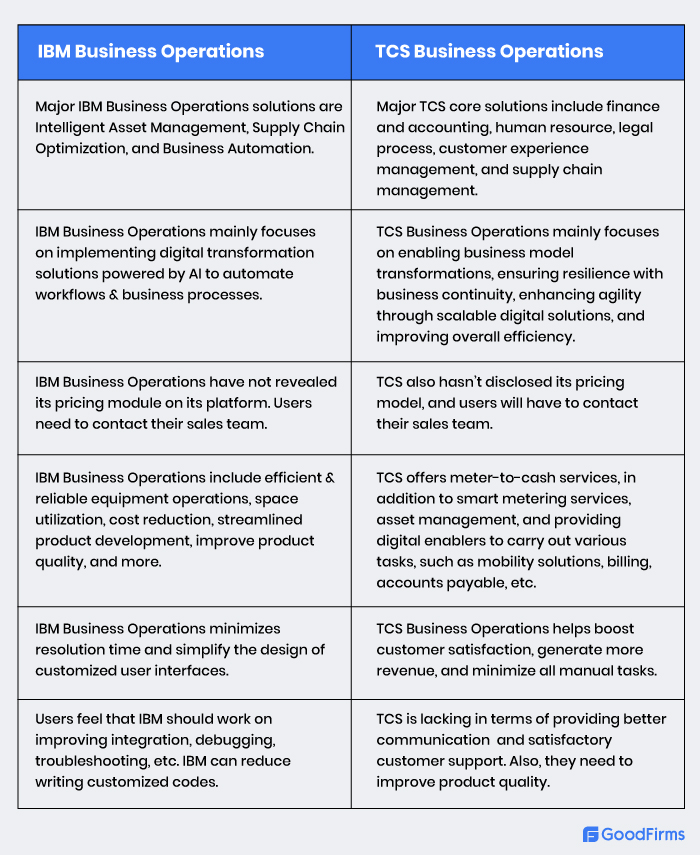
Goodfirms Review of IBM Infrastructure Solution
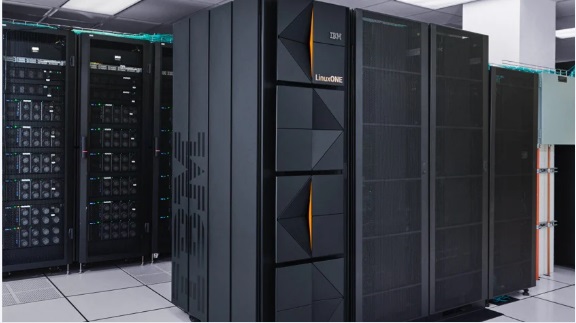
Source: IBM Infrastructure
IBM Infrastructure is a powerful technology services suite of servers and storage solutions that modernizes and optimizes hybrid cloud, including on-premise and cloud, powered by artificial intelligence and automation insights. IBM Infrastructure Solutions is categorized as:
- Modernize with Hybrid Cloud for AI - The solution allows users to run common platforms on hybrid clouds using artificial intelligence to increase scalability and performance.
- Build in Security and Data Protection - This IBM solution enables users to provide fortified and uncompromising security against all breaches and maintain data across hybrid ecosystems. All these are achieved through the right and powerful servers, improved storage, and advanced technologies.
Modernize with Hybrid Cloud for AI is further categorized into three categories. These include:
- IT for hybrid cloud- It offers open source on-premise infrastructure solutions to keep the data protected and resilient with added benefits like security, portability, and flexibility.
- AI Infrastructure- Businesses looking to modernize platforms and processes can integrate artificial intelligence and automation to bring digital transformation with servers and storage for AI. It minimizes the cost of data egress and ingress.
- IT Modernization- It has become much easier to modernize and integrate applications with hybrid clouds and AI solutions.
The major solutions for Build in Security and Data Protection include:
- IT security - Secure servers, data, and storage comprehensively with powerful IT security solutions. You can even encrypt data at scale and unlock a hybrid cloud strategy.
- Mainframes - You can use IBM Mainframes to process 1 trillion web transactions daily with ease without compromising security and trust factor.
- Data Protection - IBM has developed this solution to accelerate cyberattack detection and recovery. It helps to reduce storage and operational costs and protect data with immutable object storage.
There are IBM Technology Expert Labs that help build hybrid cloud and enterprise IT. It focuses on modernizing and improving all critical elements of infrastructure solutions, such as servers, storage, mainframes, deployment process, etc.
The Key IBM Infrastructure Products
IBM Power - IBM Power is best known to handle complex workloads due to its higher scalability and performance, helping businesses to safeguard data and modernize applications and infrastructure. It also acts as a data virtualization tool, providing improved flexibility and TCO benefits for the customers. IBM claims to provide a 99.999% uptime rating and 3.3 minutes of unplanned outages due to security lapses.
IBM Storage - To make your data resilient and hybrid cloud-ready, you need a reliable, secure, and fast solution, such as IBM Storage. The solution unifies the scattered data sources, helping you to make quick informed decisions, gain real-time valuable insights, and minimizes costs. IBM offers Storage solutions that include IBM storage for data and AI, IBM storage for hybrid cloud, and storage for data resilience. It also offers storage software, such as IBM Storage Scale, IBM Storage, Ceph, Storage Fusion, Storage, Defender, and Storage Insights.
IBM zSystems - It is a cloud computing platform from IBM that enables organizations to seamlessly migrate and adopt hybrid clouds, while the data remains encrypted and resilient. IBM zSystems offers cutting-edge technologies with accelerated AI, unparalleled security, and advanced workloads. Also, zSystems are highly compatible with multiple operating systems and run on a single Mainframe. It delivers a wide range of software solutions, such as cloud, analytics, security, DevOps, and more.
IBM Linux One - IBM has developed a robust Linux-based enterprise-grade server to simplify and optimize workloads. This IBM solution has been awarded by SEAL for building an innovative and impactful product. IBM Linux One helps to reduce the total cost of ownership and carbon footprint, lower the impact of external and internal cyber-attacks, and make data and transactions scalable based on market demands.
IBM Infrastructure: Pricing
You need to get in touch with the IBM Sales team to know the pricing of IBM Infrastructure Solutions and products.
IBM Infrastructure: Pros and Cons
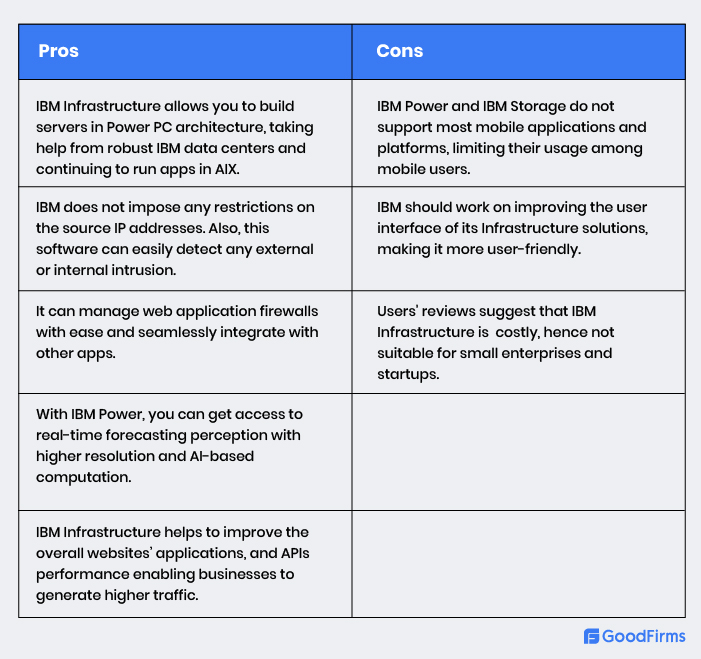
IBM Infrastructure: Viable Alternatives
IBM Infrastructure Solutions largely manages servers, storage, and software to cater to different business requirements. So, if you are searching for the best alternatives to IBM Infrastructure, you can select Oracle Cloud Infrastructure, Amazon Web Services, and Microsoft Azure.
IBM IT Infrastructure Versus Amazon Web Services (AWS)

Goodfirms Review of IBM Enterprise Security Solutions
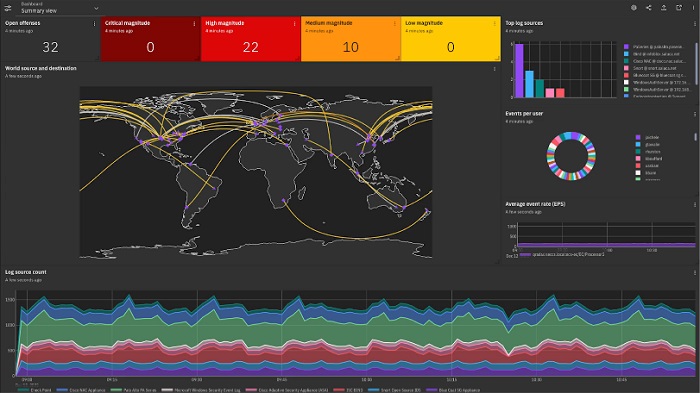
Source: IBM Enterprise Security Solutions
IBM Enterprise Security Solutions includes an advanced suite of high-quality security products and services powered by artificial intelligence and zero-trust policies. Zero trust solutions boost security resiliency and minimize risks. With IBM Security, you can connect the right user with the right data and assets, protecting them against all cyber threats and channels of uncertainty. In addition, IBM also offers cloud security services wherein the users can protect their hybrid and multi-cloud with cloud security posture management.
Top solutions
- Threat intelligence solutions
- Cloud security solutions
- Ransomware solutions
- IAM solutions
- AI cybersecurity solutions
- Data security and protection solutions
- Mobile security solutions
- Unified endpoint management solutions
- Cloud security platform
- IBM Security SOAR platform
- IBM Security SIEM platform
To combat increased cases of malware, unethical hacking, and data breaches, IBM has deployed an experienced team of X-Force Red hackers to identify possible loopholes and risky vulnerabilities. Also, to closely monitor the cyber-security threats that prevail during the ongoing Russia-Ukraine war, the company has introduced IBM Security X-Force Research Advisory, which helps to establish additional communications in Ukraine.
What’s New
- In November 2022, IBM Security partnered with Amazon Web Services (AWS) Cloud providing security strategy and secure-by-design services and enhancing agility and accelerating speed.
- IBM also introduced Zero Trust Security Solutions to secure the hybrid cloud, mitigate ransomware attacks, and safeguard the hybrid and remote workforce.
Top IBM Cybersecurity Products
IBM offers top-class cybersecurity products to protect your organization’s critical data, information, and devices offering intelligent analysis. These include
Extended Detection and Response - IBM Extended Detection and Response (XDR) includes IBM Security QRadar SIEM, QRadar SOAR, and QRadar NDR. It performs different roles, such as orchestrating responses, analyzing real-time network activity, and enabling intelligent security analytics to take instant actions.
Identity Access Management - IAM specializes in protecting hybrid and multi-cloud with advanced solutions that include IAM Security Verify, IAM Security Verify Governance, and IAM Security Verify Privilege Manager, along with Privilege Vault and Trust,
Fraud Protection - If you want to detect fraud accurately across your business process and provide a seamless customer experience, you can choose this IBM security product with IBM Security Trusteer Pinpoint Detect, Assure, and SDK. It also offers solutions like protection against phishing attacks, ransomware, and cyberthreat.
Data Security - Implementing data security solutions on the cloud becomes simpler for enhanced protection. The various solutions are a data protection platform, data resilience, and IBM Pak Cloud for Security with additional products like IBM Data Risk Manager, IBM Security Guardium Insights, and IBM Security Guardium Key Lifecycle Manager.
Mainframe Security - This cybersecurity product uses IBM’s zSystems to secure your confidential data against any cyber threat or malicious attack. The solutions include encryption everywhere, Quantum safe protection, centralized keys, planning for crypto agility, and protecting data in flight. The products are zSecure Admin, ZSecure Alert, and zSecure Audit.
Mobile Security - IBM has created a specific product IBM Security MaaS360 with Watson, to protect all your critical devices, including laptops, mobile phones, and tablets, that secure applications, documents, content, and data efficiently. It comes with features like protecting information, threat management, AI capabilities, identity management, endpoint convergence, and protected access. 3
IBM Cloud Pak for Security
IBM Cloud Pak for Security is an open source security platform that helps you seamlessly connect your business with hybrid or multi-cloud with an accelerated migration process. It also eliminates all the security loopholes and vulnerabilities while transferring data to an on-premise environment. You can gain access to deeper insights and enhance zero trust strategy.
The pricing for IBM Cloud Pak for Security contains two plans. The first is Enterprise-wide pricing, and the second is User-based pricing.
IBM Enterprise Security Solutions: Pros and Cons
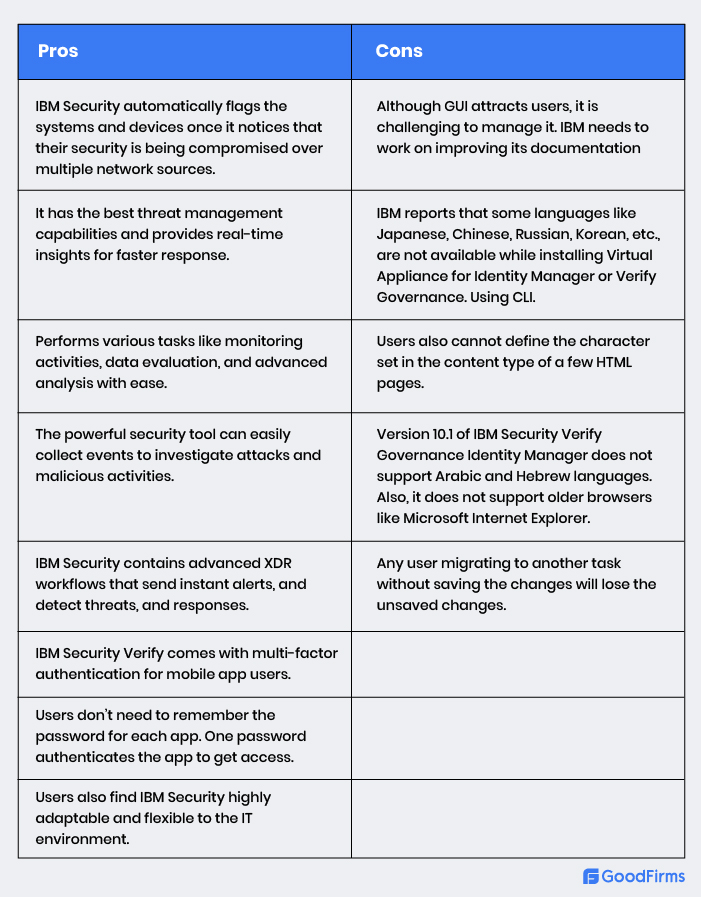
The Best Alternatives to IBM Enterprise Security
If we talk about the best alternatives to IBM Cybersecurity, then there are a few viable options. We have compared IBM Security Solutions with Okta.

Goodfirms Review of IBM Supply Chain Solutions
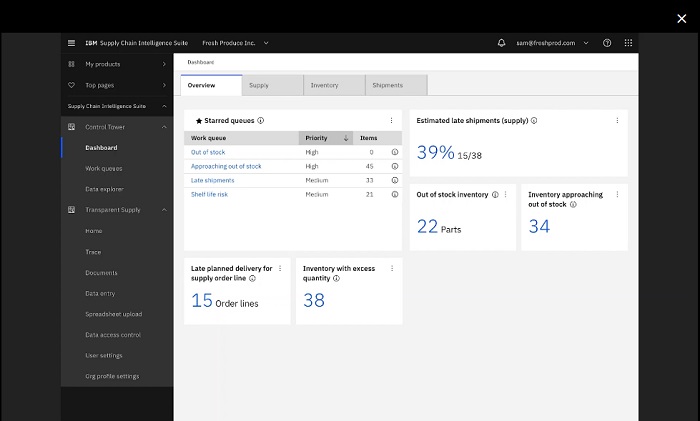
Source: IBM Supply Chain Management
If you want to efficiently manage the end-to-end production flow, starting from handling the raw materials to professionally delivering the finished products, you can look to choose a trusted partner, such as IBM Supply Chain Solutions. IBM has built a next-generation supply chain management system, powered by artificial intelligence, known for its sustainability and resilience. IBM’s supply chain solutions include complete visibility, orchestration, and transparency to inventory management and omnichannel order fulfillment processes. IBM supply chain solutions are broadly classified under IBM Sterling and IBM Supply chain intelligence suite. These solutions can be leveraged to optimize ecommerce order fulfillment and communications.
Let’s review these IBM Supply Chain solutions briefly below:
IBM Sterling
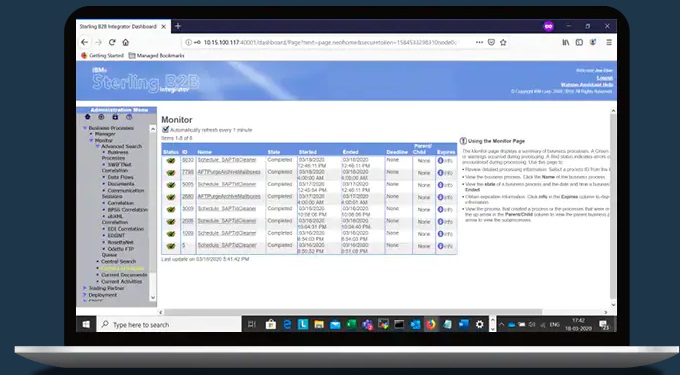
Source: IBM Sterling
Sterling is an exclusive product developed by IBM to make supply chain management more dynamic, responsive, and customer-centric. The innovative solution digitally connects the business ecosystems and processes with supply chain networks to provide real-time insights and mitigate all disruptions.
IBM Sterling offers two types of solutions:
- IBM Sterling Data Exchange
- IBM Sterling Order Management Offerings
#1.IBM Sterling Data Exchange
This innovative solution from IBM focuses on optimizing and streamlining large volumes of data related to new customers and suppliers. IBM Sterling Data Exchange simplifies workloads, prevents supply chain disruptions, and mitigates all sorts of data breaches. The solution comes with additional benefits, such as providing Managed File Transfer (MFT) software, accelerated onboarding, and minimized downtime.
IBM Sterling Data Exchange has a couple of use cases. These include:
Managed File Transfer - Managed File Transfer (MFT) software is an advanced tool allowing you to share all files and documents of any type seamlessly across enterprise or supplier network partners. It is a secured enterprise-grade file transfer system that automatically transfers files, providing end-to-end governance and visibility.
IBM Sterling B2B Integrator - This is a viable solution that helps businesses integrate all their electronic data interchange (EDI) elements and complex processes quickly across all partner platforms through a single gateway. It offers automated and consolidated high-availability B2B operations, supports 10 million daily transactions, provides certified container support, a secured B2B network, reduced installation, patch time, and much more.
Pricing for IBM Managed File Transfer
It includes three types of plans. These are
- IBM Secure File Transfer Essentials
- IBM Secure File Transfer Standard
- IBM Secure File Transfer Premium.
However, you need to contact the IBM sales team to get more detailed information.
****Please note that IBM has not provided the pricing plan for IBM Sterling B2B Integrator.
#2. IBM Order Management Offerings
This is an advanced SaaS-based solution designed for all organizations that are looking for a next-generation order management tool, to improve cross-channel efficiencies, and optimize the entire supply chain process. It also provides smooth customer onboarding, manages updates, and offers backup and recovery services.
IBM Order Management Offerings also provide two types of use cases.
- First is IBM Sterling Order Management
- Second is IBM Sterling Intelligent Promising
Let’s review them in brief.
#1. IBM Sterling Order Management - It is an advanced order management software from IBM that orchestrates and optimizes end-to-end order fulfillment to enhance customer experience and increase business sustainability. It includes Call Center and Store Engagement as add-ons and is a viable solution for B2B and B2C companies.
#2. IBM Sterling Intelligent Promising - Businesses looking to create sophisticated omnichannel experiences for their customers with optimal inventory management can plan to invest in IBM Sterling Intelligent Promising. This also serves as inventory management software, allowing shoppers to find products quickly and minimize cancellations.
IBM Sterling Order Management Pricing
There are two types of plans under IBM Sterling Order Management. These include-
1. Sterling Order Management Essentials
2. Sterling Order Management
****For IBM Sterling Intelligent Promising pricing, you need to contact the IBM sales team.
Pros and Cons of IBM Sterling
Benefits
- A single view of supply and demand across channels
- Order orchestration and centralized inventory management
- Provides Omnichannel fulfillment
- Drives improved decision-making and enhance customer satisfaction
- Managed File Transfer and B2B Integration solutions
Drawbacks
- Beginners need some training before using the software
- IBM Sterling Warehouse Management System and Transportation Management System need to be improved
- Some of the Sterling solutions, like Transportation Management, are only available in North American regions
2. IBM Supply Chain Intelligent Suite
IBM Supply Chain Intelligent Suite is an automated supply chain management tool powered by artificial intelligence that helps organizations to mitigate supply chain silos through traditional transformation. This IBM solution includes a set of innovative and high-end products that digitizes the supply chain network to increase efficiency, sustainability, and resiliency. Companies can get real-time insights to speed up agility and leverage intelligent workflows.
A few essential features of this IBM Supply Chain solution include complete immutability and trust powered by blockchain, solution extensibility, product-specific traceability, cross-functional orchestration, real-time multiple enterprise visibility, and more.
Core Products of IBM Supply Chain Intelligent Suite
Blockchain Transparent Supply
Users can create their blockchain ecosystem to enhance supply chain management with better traceability and improved forecasting abilities. The solution also ensures high-quality and authenticated products, mitigates all frictions, provides extensive automation, and much more.
Food Trust
IBM Food Trust brings growers (farmers), processors, retailers, wholesalers, consumers, etc., on one platform by establishing a collaborative network to increase accountability, transparency, and visibility across the food supply chain. This is achieved through a modular blockchain where all participants can share immutable records, transaction data, and other details.
MRO Inventory Optimization
It is a cloud-powered inventory management system offering statistical analysis, predictive analytics, and optimization algorithms to improve margins, enhance service levels, and eliminate unplanned downtime. Also, companies can focus more on priority tasks and monitor progress and workloads.
Supply Chain Control Tower
This advanced tool helps users orchestrate their supply chain process using artificial intelligence and machine learning capabilities to increase visibility and predict disruptions before they occur. The core features include intelligent workflows, and smarter integration, apart from end-to-end visibility.
Trust Your Supplier
To provide your customers with a superior experience, you must increase the trust level of suppliers with complete transparency and accessible supplier information management. The solution also offers global and industry standards, compliance and risk validators, and supplier profile management.
IBM Supply Chain Intelligent Suite Pricing
The licensing of IBM Supply Chain Intelligent Suite is based on AppPoints, which is the unit of consumption of each app. The suite contains AppPoints usage volume, reserved for a 12-month period.
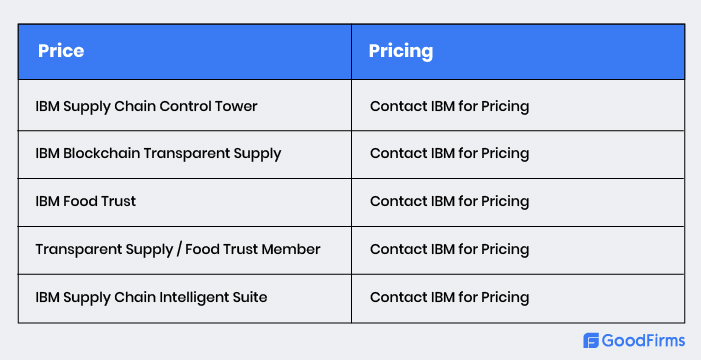
IBM Supply Chain Intelligent Suite: Pros & Cons
Advantages
- Offers end-to-end customer insights
- Increased agility to speed up information flow and decision-making
- Increase resilience, complete visibility, and reduce overall costs
- Offers a wide range of products, such as MRO Inventory Optimization, Blockchain Transparent Supply, Food Trust, Trust Your Supplier, etc.
Disadvantages
- Needs to improve the user interface of the software
- Simplify the product documentation
- For pricing, users need to contact the sales team
Apart from the above two core solutions, IBM Supply Chain also includes a few other software products, such as:
IBM Supply Chain Planning Solutions
Using this AI-powered tool, you can access accurate forecasts and eliminate all possibilities of inventory stock-out situations, supply chain mismatches, and order fulfillment delays. Businesses can use IBM Planning Analytics with Watson to seamlessly integrate internal and external datasets, identify sales patterns, predict weather forecasts, and convert disruptions into opportunities.
IBM Supply Chain Visibility Software and Solutions
The IBM solution collects these real-time data insights from electronic data interchange, supported by IBM artificial intelligence that helps to establish a connection between disparate systems and business processes. It speeds up the transaction and shipment operations to nullify all supply chain obstructions. At the same time, IBM Supply Chain Visibility solutions enabled by AI have allowed business enterprises to reap new opportunities and reduce overall costs. It brings suppliers and customers together on the same platform, where they can plan actions based on real-time insights and reports.
Alternatives to IBM Supply Chain Solutions
The best alternatives that you can consider for IBM Supply Chain Solutions are NetSuite ERP, Oracle Supply Chain Management Cloud, and SAP Supply Chain Management.
IBM Supply Chain Versus. Oracle Supply Chain Management Cloud
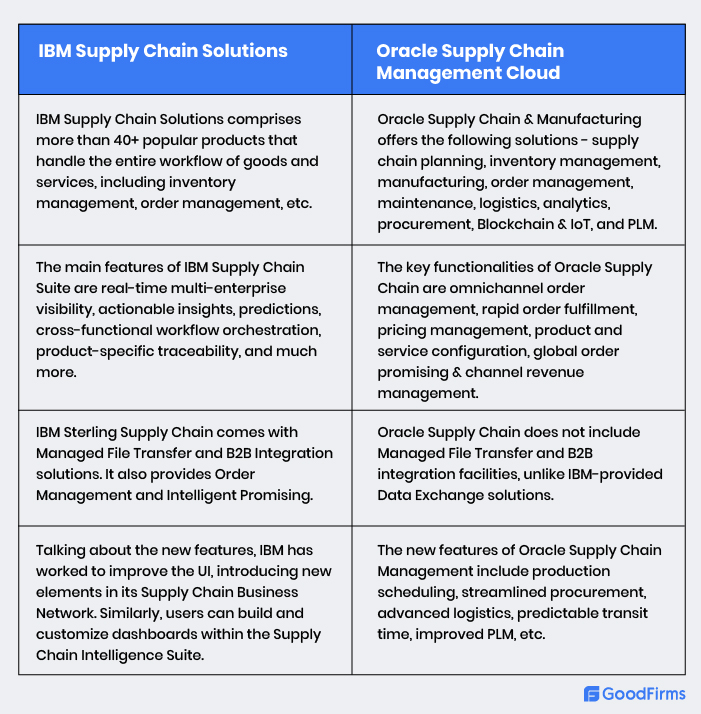
Goodfirms’ Final Take
IBM has been one of the top-notch cloud computing and solution providers with expertise in artificial intelligence, blockchain, data analytics, business operations, IT infrastructure, security, and supply chain management.
To accelerate and optimize the cloud journey, IBM partnered with Amazon Web Services (AWS) in November 2022 to work towards bettering the hybrid cloud strategy. Similarly, the company has joined hands with other tech giant VMware to modernize hybrid cloud environments and mission-critical workloads.
IBM has already braced itself to venture into building more customer-centric and futuristic products, such as building semiconductors. The company has decided to invest $20 billion in this project. The other key areas of focus include boosting the application performance and security with the z16 mainframe powered by AI and introducing accelerated discovery to unlock the potential of quantum computing and hybrid cloud to solve complex problems with speed and ease.
“IBM is always on the hunt for what’s next,” says the company.
With closer to 3,000 scientists and researchers, the company is all set to cement its position as the top technology company. Quantum computing is on the roll.
Undoubtedly, IBM offers a myriad range of products and solutions, including consulting services but a detailed review discussion suggests that the documentation of its products and services can be a bit simple. Also, IBM has not disclosed pricing for many of its products, for which users need to contact their sales representatives through the chat option. This can be a bit difficult for the users.
Overall, the company is transforming the world with its robust solutions. The company has been defining value by the way it “thinks”......and allows its users to THINK.
Computing will continue to progress and connect with IBM.
If you are an existing IBM customer using any of its products, solutions, and services, or you have used them previously to transform your business processes, please do share your experience or reviews with us.
